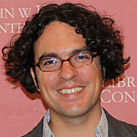 Appointment: Visiting Fellow, 2013
Appointment: Visiting Fellow, 2013
Area of study: History, Latin American Studies
Affiliation(s): Macalester College
Kluge Center project: Scientific expeditions in Ecuador and Ecuador’s national identity
Residency: March 2013 – December 2013
October 31, 2013
How have scientific expeditions in Ecuador from the 18th century through the 20th century affected Ecuador’s national identity?
Historian Ernesto Capello, Visiting Fellow at The John W. Kluge Center, is investigating the link in his new book project being researched at the Kluge Center.
Capello has spent the past nine months as a scholar-in-residence at The John W. Kluge Center at the Library of Congress. He is looking at the ways in which expeditions to Ecuador’s Andean equator by French scientists in the 18th and 20th centuries are connected to broader narratives and tropes about the region.
“This particular landscape has been layered with meanings that date back to European encounters,” Capello says. “These layers of signification ended up fostering the creation of particular political or cultural identities in Ecuador, and continue to be relevant today.”
Raised in Quito, Ecuador, Capello recalls visiting monuments to the Andean equator on field trips. The monuments celebrated an 18th century French-Ecuadorian scientific mission aimed at settling a debate on whether the Earth was either a perfect sphere, or flattened at the poles and bulging at the equator.
While researching his first book, Capello came across a second scientific mission in the 20th century that commemorated the 18th century mission. He uncovered crates of material related to the commemorative expedition in a Parisian archive, and realized an entire book project lay in front of him.
“They brought the papers to me from a warehouse, in six Indiana Jones-style wooden crates that we had to pry open with a crowbar,” Capello recalls. “This treasure trove of information was there, and I realized what I thought was an article would have to be a book.”
Capello is in residence at the Kluge Center through December, researching and writing about the missions, Ecuadorian culture, and significations of the equator in scientific understandings of the Earth. “This project is about the idea of the equator,” Capello says, “and the way it was celebrated and commemorated by Geodesic science from 18th century to the present.”
Publications
Events
- “Imagining the Equator: Commemorative Geodesic Science in the Andes, 18th -20th Centuries,” (Nov. 7, 2013)
Additional Resources
- National History Center lecture (September 2013) (nationalhistorycenter.org)
To learn more about scholars in residence at The John W. Kluge Center, email us at [email protected] or subscribe to our RSS feed.
